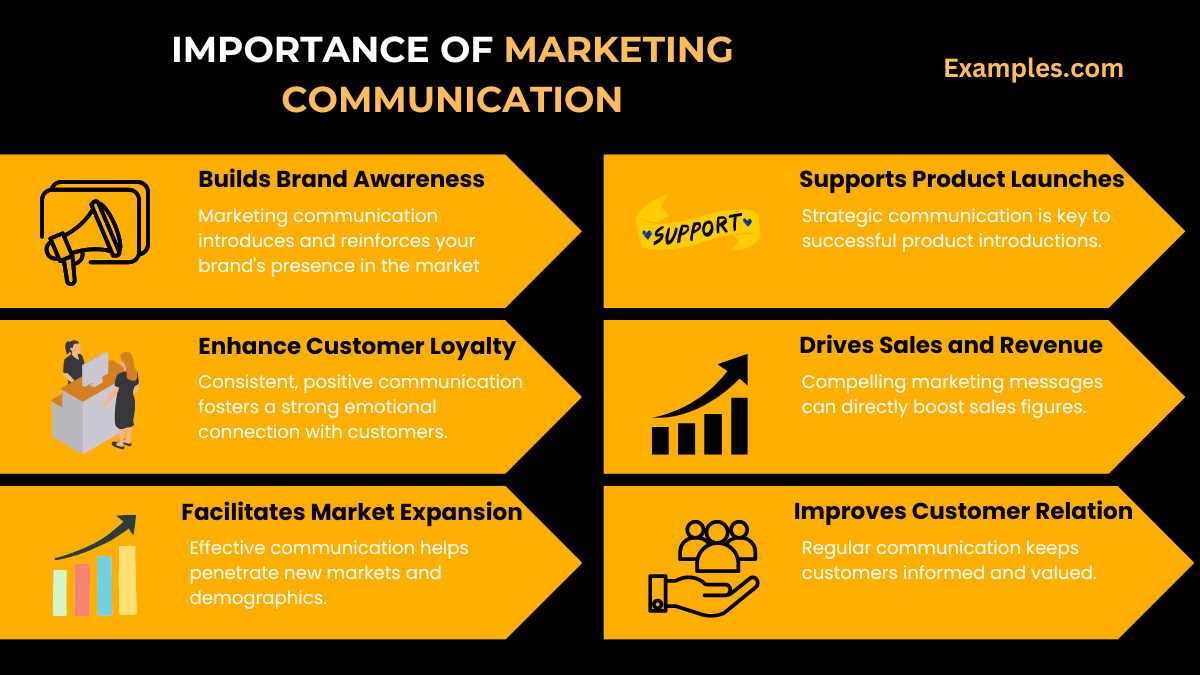Importance of Marketing Communication
Understanding the importance of marketing communication is crucial for any business looking to thrive in a competitive market. This comprehensive guide delves into the strategic use of communication to effectively convey brand messages, build lasting customer relationships, and drive business growth. From traditional advertising to digital marketing, we explore a wide array of marketing communication examples to illustrate how different strategies can be employed to reach and engage diverse audiences. Whether you’re a seasoned marketer or new to the field, this guide provides valuable insights and actionable tips to enhance your communication efforts.
What is Marketing Communication? – Definition

Marketing communication encompasses the various methods and tools that businesses use to convey their messages to consumers. It includes advertising, public relations, digital marketing, and more, aiming to inform, persuade, and remind the target audience about the brand and its offerings. This process is essential for building brand awareness, fostering customer loyalty, and driving sales, making it a fundamental component of any successful marketing strategy.
Importance of Marketing Communication

- Builds Brand Awareness: Marketing communication introduces and reinforces your brand’s presence in the market.
Example: Using social media campaigns to increase brand visibility among a younger audience. - Enhances Customer Loyalty: Consistent, positive communication fosters a strong emotional connection with customers.
Example: Sending personalized email newsletters to keep customers informed and engaged. - Facilitates Market Expansion: Effective communication helps penetrate new markets and demographics.
Example: Launching a multilingual advertising campaign to reach non-English speaking audiences. - Supports Product Launches: Strategic communication is key to successful product introductions.
Example: Utilizing teaser videos on social media to build excitement for a new product. - Drives Sales and Revenue: Compelling marketing messages can directly boost sales figures.
Example: Offering time-limited promotions through direct marketing emails. - Improves Customer Relationships: Regular communication keeps customers informed and valued.
Example: Providing timely updates on customer service inquiries through text messages. - Aids in Crisis Management: Clear, honest communication is vital during company crises.
Example: Issuing a public statement on social media during a product recall. - Encourages Customer Feedback: Open channels of communication invite valuable customer insights.
Example: Implementing a customer feedback section on the company website. - Strengthens Competitive Advantage: Unique communication strategies can set a brand apart.
Example: Creating an engaging, interactive online ad campaign. - Supports Overall Marketing Goals: Coordinated communication efforts complement and enhance overall marketing strategies.
Example: Integrating content marketing with SEO tactics for a holistic online presence.
Each point demonstrates the critical role of marketing communication in various aspects of business, from building brand identity to driving sales and fostering customer loyalty.
Importance of Marketing Communication Strategy
- Aligns Team Goals: Ensures everyone in the marketing team is working towards the same objectives. Example: A clear strategy helps a brand like Adidas align its global marketing efforts.
- Defines Brand Voice: Establishes a consistent voice and message across all platforms.
Example: Apple’s consistent branding in advertising reinforces its image as an innovative company. - Enhances Customer Engagement: Creates meaningful interactions with the target audience.
Example: Dove’s Real Beauty campaign engages customers through positive messaging. - Facilitates Targeted Messaging: Helps tailor messages to specific audience segments.
Example: Netflix uses data to tailor recommendations and communications to individual users. - Improves Market Positioning: A strong strategy positions the brand effectively against competitors.
Example: Tesla’s focus on sustainability differentiates it in the automotive market. - Supports New Product Launches: Communicates the benefits of new products effectively.
Example: Samsung’s strategic campaigns during new smartphone launches. - Drives Sales and Revenue: Directly impacts the company’s bottom line by boosting sales.
Example: Amazon’s Prime Day marketing strategy significantly increases sales. - Builds Long-term Relationships: Establishes a lasting connection with customers.
Example: Starbucks’ loyalty program communication fosters long-term customer relationships. - Adapts to Market Changes: Allows flexibility to adapt to evolving market trends.
Example: Coca-Cola’s strategy evolves with changing consumer preferences. - Measures Success and ROI: Provides a framework for measuring marketing effectiveness.
Example: Google Analytics offers insights into the success of digital marketing strategies.
Importance of Marketing Communication at Workplace
- Fosters Team Collaboration: Encourages collaboration among different departments.
Example: Cross-functional meetings at Microsoft enhance project outcomes. - Enhances Internal Branding: Builds a strong internal brand identity.
Example: Google’s internal communication reinforces its innovative culture. - Improves Employee Engagement: Keeps employees informed and engaged with company goals.
Example: Monthly town hall meetings at Zappos boost employee morale. - Supports Change Management: Effective during organizational changes and transitions.
Example: Internal communication at IBM during restructuring helps in smooth transitions. - Drives Employee Advocacy: Empowers employees to become brand ambassadors.
Example: Adobe employees sharing their positive work experiences on LinkedIn. - Reduces Misinformation: Prevents the spread of rumors within the workplace.
Example: Regular updates from leadership at Infosys minimize rumors. - Aligns with Corporate Goals: Ensures employees understand and align with company objectives.
Example: Annual strategy presentations at Salesforce align employees with corporate goals. - Enhances Job Satisfaction: Employees feel valued when kept informed.
Example: Regular feedback sessions at Netflix increase employee satisfaction. - Promotes Transparency: Open communication builds trust among employees.
Example: Transparency in decision-making at Patagonia builds employee trust. - Facilitates Efficient Workflow: Streamlines communication for smoother workflow.
Example: Slack channels at Airbnb enhance team communication efficiency.
Importance of Marketing Communication in Business
- Builds Brand Awareness: Essential for establishing brand identity in the market.
Example: Coca-Cola’s global campaigns build strong brand recognition. - Drives Customer Acquisition: Attracts new customers through targeted communication.
Example: Facebook ads effectively target and acquire new customers. - Enhances Customer Retention: Keeps existing customers engaged and loyal.
Example: Amazon’s personalized emails encourage repeat purchases. - Supports Business Growth: Vital for scaling the business and entering new markets.
Example: Uber’s communication strategies support its global expansion. - Improves Market Perception: Influences how the market views the brand.
Example: Patagonia’s environmental stance improves its market perception. - Facilitates Competitive Advantage: Differentiates the brand from competitors.
Example: Nike’s unique marketing campaigns set it apart in the sports industry. - Enables Effective Crisis Management: Communicates effectively during crises to maintain brand reputation.
Example: Tylenol’s response to the 1982 crisis maintained its brand reputation. - Supports Product Positioning: Positions products effectively in consumers’ minds.
Example: Apple’s marketing positions its products as premium and desirable. - Informs Product Development: Feedback from marketing communication shapes future products.
Example: Customer feedback via social media influences Samsung’s product features. - Maximizes ROI on Marketing Spend: Ensures efficient use of the marketing budget.
Example: Targeted online ads by small businesses maximize ROI.
The importance of marketing communication cannot be overstated. It aligns teams, defines brand voice, and drives sales, fostering strong connections with customers. Effective strategies, workplace integration, and business alignment are key. This guide offers insights into crafting impactful communications, emphasizing the need for clarity, consistency, and audience understanding, vital for any successful marketing endeavor.



